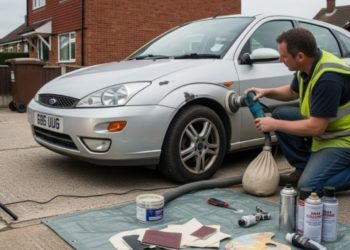As the UK accelerates its efforts to combat climate change, the conversation around reducing our carbon footprints has never been more critical.
In recent years, the government has introduced various measures to encourage sustainable living, including the promotion of electric vehicles (EVs) and the phasing out of new petrol and diesel cars by 2030.
While these initiatives are pivotal, another significant yet often overlooked aspect of eco-conscious living is the purchase of used cars. This practice not only makes financial sense but also offers substantial environmental benefits.
Cutting production emissions
One of the most significant environmental benefits of buying a used car is the reduction in production emissions.
Manufacturing a new car involves extracting raw materials, producing various components, and assembling the vehicle, all of which contribute to a considerable amount of greenhouse gases. It’s estimated the production of a typical medium-sized family car emits approximately 6 tonnes of CO2. By purchasing a used car, you avoid these emissions, effectively reducing your overall carbon footprint.
Moreover, the energy-intensive processes involved in producing electric vehicles mean that even though they have lower emissions during their operational life, the initial carbon footprint can be high. By opting for a pre-owned vehicle, you bypass the environmental impact associated with new car production entirely.
Extending vehicle lifespans
When cars are used for longer periods, the need for new cars decreases, which in turn reduces the demand for new car production. This cyclical benefit means fewer resources are extracted, and less energy is consumed, leading to a lower overall environmental impact.
Modern cars are built to last longer than ever before. With proper maintenance, a car can easily remain operational for 15 years or more. By choosing to buy a used car and maintaining it well, you contribute to a culture of sustainability and resourcefulness.
Financial benefits
Buying a used car is not only environmentally friendly but also economically advantageous. New cars depreciate rapidly, losing a significant portion of their value within the first few years of ownership. Used cars, on the other hand, have already undergone this initial depreciation, meaning they retain their value better over time. This makes them a more financially sound investment.
Furthermore, lower purchase prices and reduced insurance costs make used cars an attractive option for budget-conscious consumers. These financial benefits can free up resources that can be allocated towards other eco-friendly practices, such as investing in renewable energy sources or supporting sustainable businesses.
Industry trends and policy shifts
The automotive industry is experiencing significant shifts towards sustainability. In the UK, the government has been proactive in encouraging greener practices within the sector.
The Road to Zero strategy, for instance, outlines plans to reduce vehicle emissions and increase the adoption of zero-emission vehicles. However, it also highlights the importance of sustainable vehicle use, which includes extending the lifecycle of existing cars.
Moreover, the growth of certified pre-owned programmes by car manufacturers has made buying used cars more reliable and appealing. These often include thorough inspections, warranties, and service plans, providing peace of mind for consumers while promoting the use of existing vehicles.
David Prior
David Prior is the editor of Today News, responsible for the overall editorial strategy. He is an NCTJ-qualified journalist with over 20 years’ experience, and is also editor of the award-winning hyperlocal news title Altrincham Today. His LinkedIn profile is here.


![7 Best POS Software in the UK [2026 Edition]](https://todaynews.co.uk/wp-content/uploads/2026/02/7-Best-POS-Software-in-the-UK-2026-Edition-360x180.png)








































































